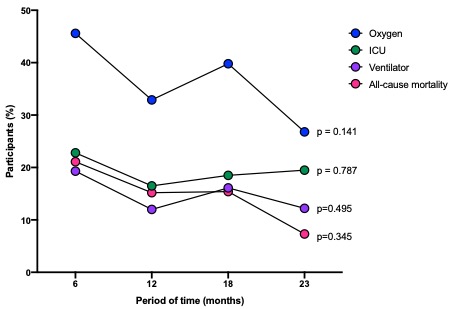Outcomes of COVID-19 in Solid Organ Transplant Recipients in Canada 2020-2021: A Prospective, Multicenter Cohort Study
V. G. Hall1, G. Alahmadi2, J. T. Solera2, T. Marinelli2, H. Cardinal3, G. Prasad4, S. A. De Serres5, D. Isaac6, R. Mainra7, C. Lamarche8, R. Sapir-Pichhadze9, S. Gilmour10, A. Humar2, D. Kumar2
1University Health Network/Toronto General Hospital, Toronto, ON, Canada, 2UHN, Toronto, ON, Canada, 3UMontreal, Montreal, QC, Canada, 4StMH, Toronto, ON, Canada, 5Laval U, Quebec, QC, Canada, 6UCalgary, Calgary, AB, Canada, 7USaskatchewan, Saskatoon, SK, Canada, 8HMR, Montreal, QC, Canada, 9McGill U, Montreal, QC, Canada, 10SCH, Edmonton, AB, Canada
Meeting: 2022 American Transplant Congress
Abstract number: 698
Keywords: COVID-19, Infection, Multicenter studies, Vaccination
Topic: Clinical Science » Infection Disease » 24 - All Infections (Excluding Kidney & Viral Hepatitis)
Session Information
Session Name: All Infections (Excluding Kidney & Viral Hepatitis) I
Session Type: Poster Abstract
Date: Saturday, June 4, 2022
Session Time: 5:30pm-7:00pm
 Presentation Time: 5:30pm-7:00pm
Presentation Time: 5:30pm-7:00pm
Location: Hynes Halls C & D
*Purpose: To understand the outcomes and changes in disease severity of COVID-19 in Solid Organ Transplant (SOT) recipients over time in the context of therapeutic advances.
*Methods: We performed a multicenter, prospective cohort study of all SOT recipients diagnosed with COVID-19, across 9 transplant programs in Canada, from March 2020-November 2021. Baseline characteristics, demographics, treatment and disease severity outcomes were collected. The primary outcome was need for supplemental oxygen. Factors associated with the primary outcome and changes in outcomes over time were analyzed. Pandemic time periods were divided into four time frames coinciding with 4 waves in North America.
*Results: We enrolled 509 SOT recipients with confirmed COVID-19 during the study period. The risk factors associated with oxygen requirement are outlined in Table 1. Severe disease and mortality were greatest in lung transplant recipients compared to other organ types (15/48 (31.3%) lung deaths vs 63/461(13.7%) nonlung organs, (p=0.001). There was no influence of 2-dose vaccination and 3 patients were infected after 3-dose vaccine. Disease with alpha or delta variant was not associated with increased oxygen requirement. In a subgroup analysis of participants requiring oxygen (n=190), remdesivir was associated with less death (p=0.035). Over the pandemic period (Figure 1), there were no significant changes in the proportion of patients requiring oxygen, ICU admission, ventilatory support or death.
| Characteristic, n (%) | No oxygen requirement, n = 319 | Oxygen requirement, n = 190 | p value |
| Age (years), median, IQR | 55.0 (42.8 – 63.0) | 62.1 (52.0 – 69.0) | <0.001 |
| Number of comorbidities, median, IQR | 2 (1-3) | 3 (2-3) | <0.001 |
| Lung transplant, n, % | 19 (5.96) | 29 (15.3) | <0.001 |
| Liver transplant, n, % | 64 (20.1) | 15 (7.89) | <0.001 |
| Prednisone, n, % | 237 (74.3) | 174 (91.6) | <0.001 |
| Mycophenolate mofetil/ mycophenolate sodium, n, % | 218 (68.3) | 152 (80) | 0.004 |
| Lymphocyte count at diagnosis (103 cells/μL), median (IQR) | 0.975 (0.60 – 1.5) | 0.635 (0.40 – 1.0) | <0.001 |
Figure 1. Disease severity outcomes & change over time from Jan, 2020 – Nov, 2021.
*Conclusions: COVID-19 is especially severe in lung transplant recipients and immunosuppression plays a significant role. The outcomes associated with COVID-19 in SOT have not appreciably changed over time despite the emergence of novel variants and changes in therapeutic regimens.
To cite this abstract in AMA style:
Hall VG, Alahmadi G, Solera JT, Marinelli T, Cardinal H, Prasad G, Serres SADe, Isaac D, Mainra R, Lamarche C, Sapir-Pichhadze R, Gilmour S, Humar A, Kumar D. Outcomes of COVID-19 in Solid Organ Transplant Recipients in Canada 2020-2021: A Prospective, Multicenter Cohort Study [abstract]. Am J Transplant. 2022; 22 (suppl 3). https://atcmeetingabstracts.com/abstract/outcomes-of-covid-19-in-solid-organ-transplant-recipients-in-canada-2020-2021-a-prospective-multicenter-cohort-study/. Accessed February 25, 2026.« Back to 2022 American Transplant Congress

